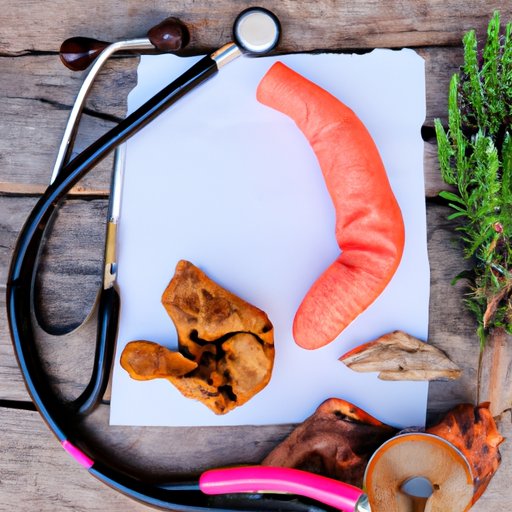
I. Introduction
Hemorrhoids are a common problem among many individuals, ranging from mild to severe cases. It results from constipation, pregnancy, low-fiber diet, obesity, and many others, causing discomfort and unbearable pain. Hemorrhoids are not a severe condition, but it can affect the quality of life. Fortunately, there are ways on how to get rid of hemorrhoids naturally.
This article will provide tips, natural remedies and expert advice that can help individuals manage and treat their hemorrhoids. Furthermore, natural remedies are mostly safe and cheaper than prescribed medication.
II. Preventing Hemorrhoids: The Basics
Prevention is always better than cure, and a few changes in a person’s lifestyle can significantly help prevent hemorrhoids. One of the main causes of hemorrhoids is constipation; therefore, maintaining a high-fiber diet, such as vegetables, fruits, and whole grains, can help regulate bowel movement.
When individuals experience bowel movements without any strain, it decreases the chances of hemorrhoids. In addition, consuming lots of fluids, specifically water, frequently during the day, is essential for preventing constipation and avoiding dehydration. It is also relevant to do physical exercise, specifically activities that promote regular blood flow to the rectum area.
Lastly, individuals can consider lifestyle changes to prevent or manage their hemorrhoids. Some changes include avoiding sedentary lifestyles, preventing long periods of standing or sitting, and avoiding unnecessary straining during bowel movements.
III. Natural Remedies for Hemorrhoids
There are ways on how to get rid of hemorrhoids naturally at home. Although the results may vary, the natural remedies below have generally been proven to be safe and effective for most individuals.
One of the remedies is to sit in a sitz bath filled with warm water for about 15 minutes daily, which can soothe the swollen veins and reduce inflammation. Another approach is using witch hazel pads or applying witch hazel directly to the hemorrhoids. It contains anti-inflammatory properties that help reduce pain and swelling.
Some homemade remedies that can be used to treat hemorrhoids include applying an ice pack to the affected area and soaking a cotton pad in diluted apple cider vinegar and applying it to the affected area. Furthermore, using oils such as aloe vera, coconut oil, and olive oil can also soothe and reduce inflammation in hemorrhoids. It is essential to note that natural remedies need to be used correctly to avoid any adverse effects.
IV. Herbal Remedies for Hemorrhoids
Herbal remedies also provide a natural treatment option for hemorrhoids. The following are some herbs that have been proven to help relieve hemorrhoid symptoms.
Horse chestnut contains a compound called Aescin, which acts as an anti-inflammatory agent and helps strengthen the veins. Witch hazel is also an herb that contains anti-inflammatory properties that can be beneficial for individuals with hemorrhoids. Another herb is Butcher’s broom; it contains ruscogenins which can improve blood flow and reduce inflammation, especially for those with chronic hemorrhoids.
Individuals are advised to follow the recommended dosage for each herb, which can vary depending on the method of consumption and concentration of the herb. However, it is essential to speak with a health professional before using any herbal remedies, as it can cause interactions with medication or other health conditions.
V. Ayurvedic and Alternative Medicine Approaches
Ayurvedic and Alternative medicine practices also offer natural remedies for managing hemorrhoids. They provide an integrated approach in treating the body and mind, often looking at the root cause instead of only treating the symptoms.
One practice is acupuncture, a method where the practitioner inserts needles into specific points on the body to improve blood flow and reduce inflammation. Acupressure is another method that offers similar benefits to acupuncture; however, it uses pressure instead of needles.
It is important to take precautions before pursuing any alternative medicine approaches and consult a health professional. They can provide guidance on which practices are safe or if it can cause interactions with any medication or health condition.
VI. Expert Tips and Advice
Dr. Olivia Clark, MD, a gastroenterologist at the University of California, shares her expertise and advice on how to manage and treat hemorrhoids naturally.
Dr. Clark emphasizes that drinking plenty of water and consuming high-fiber foods is essential in managing and preventing hemorrhoids. Furthermore, she recommends using sitz baths as a natural remedy to ease pain and swelling.
She advises that individuals do not strain during bowel movements and avoid sitting for long periods of time. Dr. Clark suggests that individuals seek medical attention if they experience severe bleeding, pain, or if symptoms persist despite home remedies or lifestyle changes.
VII. Conclusion
Hemorrhoids are a common problem that can be managed and treated through natural remedies, preventive tips, and lifestyle changes. Natural remedies, such as sitz baths, witch hazel pads, and herbs such as horse chestnut and butcher’s broom, can provide relief from symptoms. Preventive measures, such as maintaining a high-fiber diet and regular exercise, are crucial in managing hemorrhoids.
Individuals can also consider alternative medicine practices such as acupuncture and acupressure. When pursuing natural remedies or alternative medicine approaches, individuals should take precautions, speak to health professionals, and follow recommended dosages.
It is always best to seek medical attention if symptoms persist or worsen, but with the right management, individuals can live comfortably with hemorrhoids.
VIII. References
- Mayo Clinic. (n.d). Hemorrhoids. Retrieved from https://www.mayoclinic.org/diseases-conditions/hemorrhoids/symptoms-causes/syc-20360268
- University of Rochester Medical Center. (n.d). Hemorrhoids. Retrieved from https://www.urmc.rochester.edu/encyclopedia/content.aspx?contenttypeid=85&contentid=P07498
- National Center for Complementary and Integrative Health. (2021, May 3). Herbs at a Glance: Horse Chestnut. Retrieved from https://www.nccih.nih.gov/health/horse-chestnut
- Lao, L. (2013). Acupuncture for chronic pain: Can it be avoided? The Lancet Neurology, 12(3), 217-218. doi: 10.





